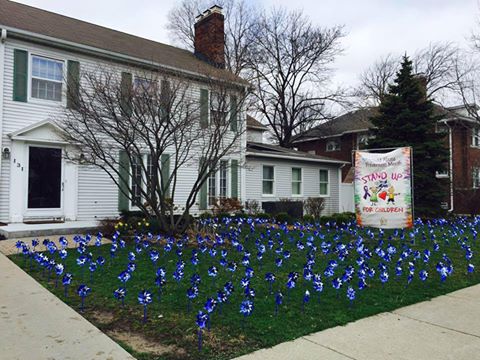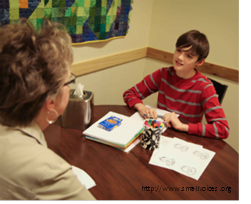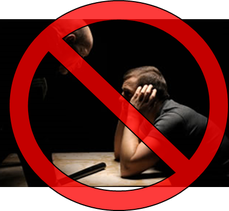Posted by Lauren B on October 5, 2016
Care House…if any of you are like me, the first time I heard this name, I had no idea what is was, what it meant, or what it did. The first time I heard it, I was meeting with my internship coordinator at Oakland University. I had told her I had a passion for working with kids and wanted my internship experience to capitalize on that in one way or another. After flipping through a few files, she looked at me and said, “How about Care House?”…I think my first reaction was “Huh?” I had no idea what it was! She handed me an internship description that read as follows:
“It is important that all prospective interns understand we service a specialized population here. Interns will see clients and family members suffering from trauma related to child sexual abuse, other child abuse and neglect, witnesses to violent crimes including homicide and accidental death, grief and loss."
Needless to say, it’s not what I expected, but felt immediately drawn to it. Several months later, here I am interning at Care House and sharing with you what I have learned in my past four months here.
To put it formally, Care House is an advocacy center that helps child victims of abuse and their families heal by providing a child-friendly place for services, including the coordination of forensic interviews, crisis counseling, child safety assessments, individual and group therapy, support groups, family advocacy, access to forensic medical examinations and referrals to other needed community resources. All the services provided are free to the families served.
Before I go on to break it all down, here’s a picture of what our place looks like. The pinwheels represent all the children we helped in a year…look how many there are!
Care House…if any of you are like me, the first time I heard this name, I had no idea what is was, what it meant, or what it did. The first time I heard it, I was meeting with my internship coordinator at Oakland University. I had told her I had a passion for working with kids and wanted my internship experience to capitalize on that in one way or another. After flipping through a few files, she looked at me and said, “How about Care House?”…I think my first reaction was “Huh?” I had no idea what it was! She handed me an internship description that read as follows:
“It is important that all prospective interns understand we service a specialized population here. Interns will see clients and family members suffering from trauma related to child sexual abuse, other child abuse and neglect, witnesses to violent crimes including homicide and accidental death, grief and loss."
Needless to say, it’s not what I expected, but felt immediately drawn to it. Several months later, here I am interning at Care House and sharing with you what I have learned in my past four months here.
To put it formally, Care House is an advocacy center that helps child victims of abuse and their families heal by providing a child-friendly place for services, including the coordination of forensic interviews, crisis counseling, child safety assessments, individual and group therapy, support groups, family advocacy, access to forensic medical examinations and referrals to other needed community resources. All the services provided are free to the families served.
Before I go on to break it all down, here’s a picture of what our place looks like. The pinwheels represent all the children we helped in a year…look how many there are!
Okay, so now that you can see that there is hope for all these kids and families, here is the breakdown of everything I just explained into commonly asked questions…hopefully you all can follow me:
1. How does my child end up at Care House?
This whole process starts when a police report or Child Protective Services (CPS) report is made.One of the two parties contacts Care House to set up a forensic interview and the child and/or family comes in to be interviewed by a trained professional.Besides the initial police and/or CPS report, this is the first step in the entire investigation where Care House, law enforcement, and CPS worker join together.
2. What is a forensic interview?
It’s kind of a scary term that normally reminds people of a dark room, at the police station, with one table and the one super bright light that’s pointing directly at the person being interviewed…that, my friends, is an interrogation.What we do at Care House is much less intimidating and much more kid-friendly; we have trained professionals who sit down with the child and have an open-ended conversation, following specific guidelines, to get as much information as possible about what the kids have experienced or witnessed.We don’t ask leading questions or “put things in the kids’ heads.” Instead we provide a supportive environment and use open-ended questions that allow the child to share their experience.
So to review, we do this: NOT this
1. How does my child end up at Care House?
This whole process starts when a police report or Child Protective Services (CPS) report is made.One of the two parties contacts Care House to set up a forensic interview and the child and/or family comes in to be interviewed by a trained professional.Besides the initial police and/or CPS report, this is the first step in the entire investigation where Care House, law enforcement, and CPS worker join together.
2. What is a forensic interview?
It’s kind of a scary term that normally reminds people of a dark room, at the police station, with one table and the one super bright light that’s pointing directly at the person being interviewed…that, my friends, is an interrogation.What we do at Care House is much less intimidating and much more kid-friendly; we have trained professionals who sit down with the child and have an open-ended conversation, following specific guidelines, to get as much information as possible about what the kids have experienced or witnessed.We don’t ask leading questions or “put things in the kids’ heads.” Instead we provide a supportive environment and use open-ended questions that allow the child to share their experience.
So to review, we do this: NOT this
3. What happens after the interview?
A lot of parents and families assume that if their child tells us they witnessed or experienced abuse, it’s a done deal and the “bad guy” will be put in jail immediately. Unfortunately, this isn’t the case, because as I said before, Care House is the FIRST step in the entire process. Immediately after the interview, the parents meet with the interviewer, law enforcement, CPS, and an on-staff counselor. The parents are given an idea of how the interview went and what law enforcement and CPS’ next steps are. A counselor then follows up with the family to provide resources, offer support, and answer any further questions they have. If a child or family member appears to be at risk for suicide or self-harm, a counselor will meet with them to assess the level of risk and take the necessary steps to make sure they are safe when leaving here.
4. How is Care House’s counseling different than other counseling centers?
Care House’s counseling is different than most because our therapists and social workers are trained to work with kids who have been exposed to trauma. Children and families who have been traumatized have an entirely different set of needs than those clients coming in for non-trauma related problems. We follow the Trauma-Focused Cognitive Behavioral (TF-CBT) model of therapy that focuses on:
- Providing information about child trauma and abuse
- Parenting skills on how to deal with the issues that arise from their child being traumatized
- Teaching relaxation techniques and skills to regulate emotions
- Processing the child’s experience of trauma
- Teaching the children and parents safety skills
We also provide therapy and support groups for kids and their family members. The therapy groups help to enhance the healing process by teaching everything I listed above in a fun and engaging way. The support groups are more for the parents, to help them develop a support system and share their experiences with other families who have been through a similar experience. It’s important for people to come together during difficult and trying times to encourage one another and offer advice about the things they have learned along the way.
Hopefully this gives you a better idea of who we are and what we do at Care House. If you have any further questions, feel free to call us at (586) 463-0123 or visit our website at www.mccarehouse.org. For more information on the TF-CBT model of therapy and other great resources, check out https://tfcbt.org/



 RSS Feed
RSS Feed
